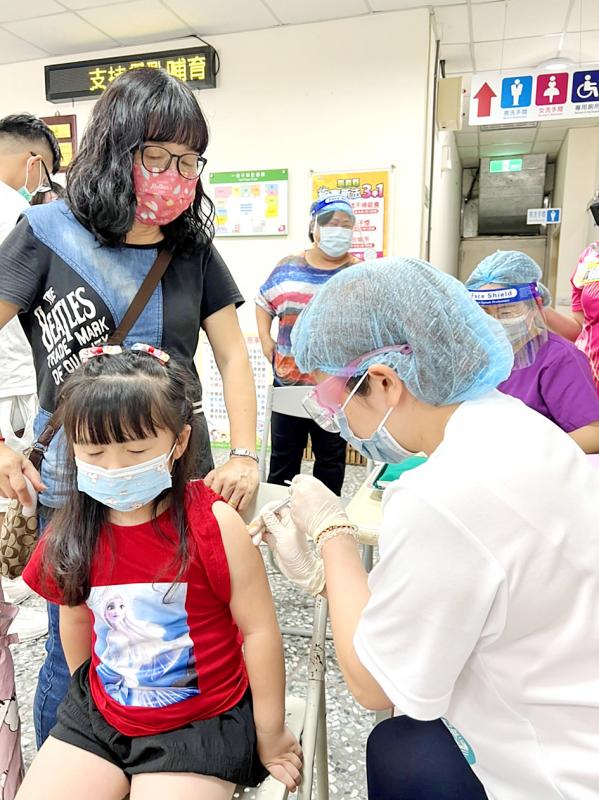Five hundred days after being infected with COVID-19, only 30 percent of 260 people studied retained a sufficient number of antibodies to protect them from future infections, a study commissioned by the Centers for Disease Control found.
Of the 30 percent, those with the highest number of antibodies had either been vaccinated after recovering from the disease, or had experienced severe symptoms, the centers said, adding that based on the findings, it recommends that people who have had COVID-19 still get vaccinated.
The centers commissioned National Yang Ming Chiao Tung University to perform the study using data from Jan. 22, 2020 to July 31 last year.

Photo courtesy of Chiayi County Government via CNA
ANTIBODIES
Wu Chun-chung (吳俊忠), who heads National Yang Ming Chiao Tung University’s Department of Biotechnology and Labratory Science in Medicine, on Sunday said that the research team used antibody tests from Swiss pharmaceuticals company Roche Holding AG to test 487 samples for antibodies, while another 376 samples were sent to Academia Sinica to be tested for neutralizing antibodies.
The number of people in Taiwan who had COVID-19 was low when the team began its study, so many of those included in the data were added after May last year, Wu said.
Whether subjects in the study continued to participate after one year, whether their samples were kept by the hospitals where they were originally treated and other factors affected the quantity of data the team had access to, he said.
“The globally agreed-upon standard is that 45.97 international units per milliliter of blood is enough neutralizing antibodies to offer protection against COVID-19,” Wu said. “In our study, about 30 percent of the subjects had this level of protection 500 days after recovery from the disease.”
The team also considered other factors such as body mass index, gender, age, living environment and whether the subject was a smoker, he said, adding that generally those who experienced more severe COVID-19 symptoms retained a greater number of antibodies.
EARLY VARIANTS
Although the majority of the subjects tested had been infected with earlier variants of SARS-CoV-2, the antibodies they retained still provide some protection against the Omicron variant of SARS-CoV-2, Wu said.
However, in terms of antibodies retained following vaccination, the team is continuing its research, as the subjects in the study had mostly been vaccinated with the same brand of vaccine, and had mostly only had only one shot, he said.

CALL FOR SUPPORT: President William Lai called on lawmakers across party lines to ensure the livelihood of Taiwanese and that national security is protected President William Lai (賴清德) yesterday called for bipartisan support for Taiwan’s investment in self-defense capabilities at the christening and launch of two coast guard vessels at CSBC Corp, Taiwan’s (台灣國際造船) shipyard in Kaohsiung. The Taipei (台北) is the fourth and final ship of the Chiayi-class offshore patrol vessels, and the Siraya (西拉雅) is the Coast Guard Administration’s (CGA) first-ever ocean patrol vessel, the government said. The Taipei is the fourth and final ship of the Chiayi-class offshore patrol vessels with a displacement of about 4,000 tonnes, Lai said. This ship class was ordered as a result of former president Tsai Ing-wen’s (蔡英文) 2018

UKRAINE, NVIDIA: The US leader said the subject of Russia’s war had come up ‘very strongly,’ while Jenson Huang was hoping that the conversation was good Chinese President Xi Jinping (習近平) and US President Donald Trump had differing takes following their meeting in Busan, South Korea, yesterday. Xi said that the two sides should complete follow-up work as soon as possible to deliver tangible results that would provide “peace of mind” to China, the US and the rest of the world, while Trump hailed the “great success” of the talks. The two discussed trade, including a deal to reduce tariffs slapped on China for its role in the fentanyl trade, as well as cooperation in ending the war in Ukraine, among other issues, but they did not mention

HOTEL HIRING: An official said that hoteliers could begin hiring migrant workers next year, but must adhere to a rule requiring a NT$2,000 salary hike for Taiwanese The government is to allow the hospitality industry to recruit mid-level migrant workers for housekeeping and three other lines of work after the Executive Yuan yesterday approved a proposal by the Ministry of Labor. A shortage of workers at hotels and accommodation facilities was discussed at a meeting of the legislature’s Transportation Committee. A 2023 survey conducted by the Tourism Administration found that Taiwan’s lodging industry was short of about 6,600 housekeeping and cleaning workers, the agency said in a report to the committee. The shortage of workers in the industry is being studied, the report said. Hotel and Lodging Division Deputy Director Cheng

‘SECRETS’: While saying China would not attack during his presidency, Donald Trump declined to say how Washington would respond if Beijing were to take military action US President Donald Trump said that China would not take military action against Taiwan while he is president, as the Chinese leaders “know the consequences.” Trump made the statement during an interview on CBS’ 60 Minutes program that aired on Sunday, a few days after his meeting with Chinese President Xi Jinping (習近平) in South Korea. “He [Xi] has openly said, and his people have openly said at meetings, ‘we would never do anything while President Trump is president,’ because they know the consequences,” Trump said in the interview. However, he repeatedly declined to say exactly how Washington would respond in